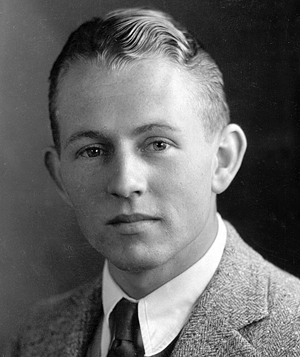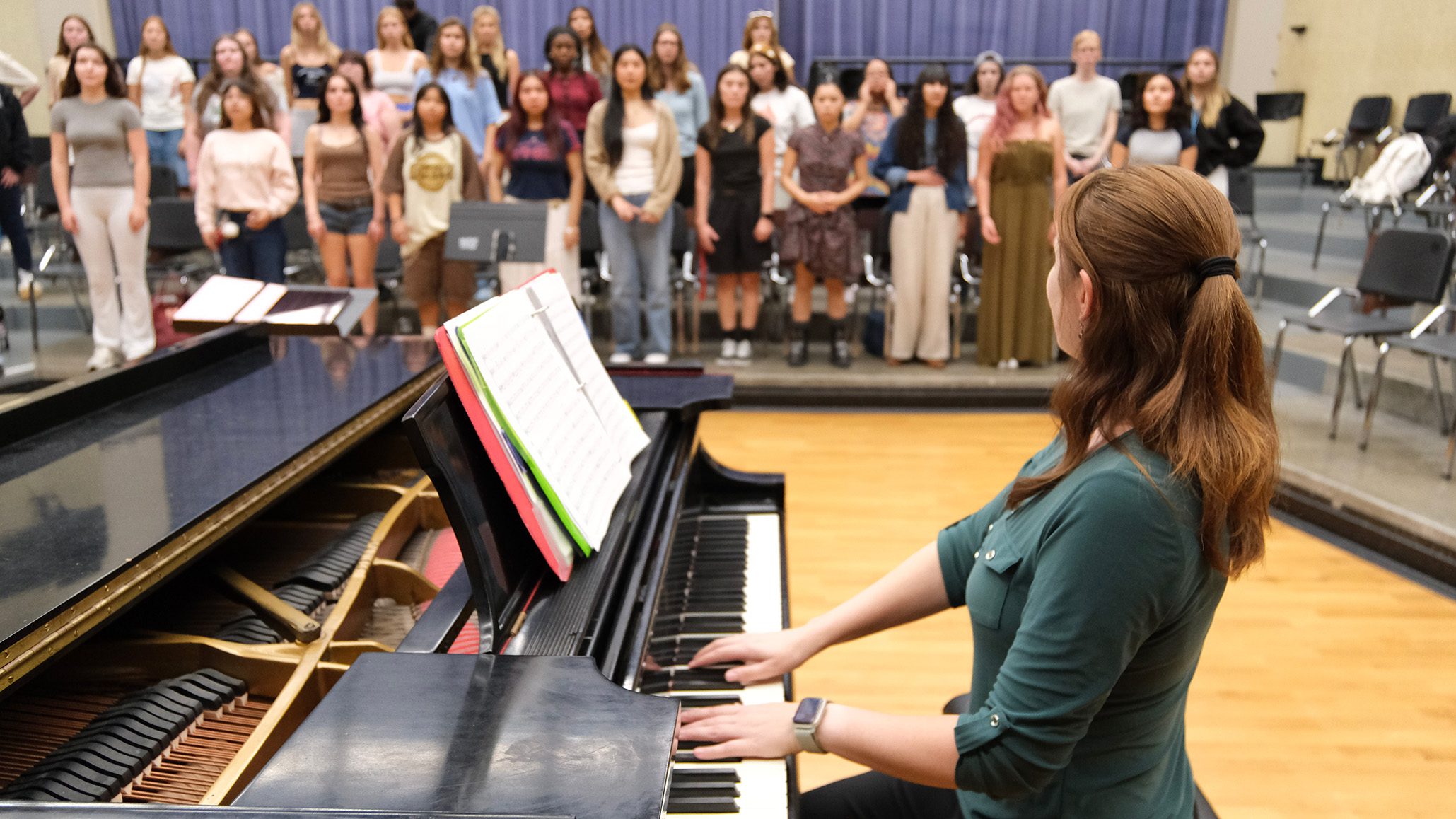Work of Art
A weekly visitor to living rooms across America, Art Linkletter was a television pioneer and self-made man.

Reprinted from SDSU Magazine, winter 2002
Arthur Gordon Linkletter was just a kid at San Diego’s Woodrow Wilson Junior High when he discovered his future. It unfolded before him in the grandiose words and gestures of a traveling speaker.
“He was a typical, old-fashioned orator – stentorian,” Linkletter remembers more than 75 years later. “Everything was very broad and very loud and very exaggerated. I thought that was just wonderful. I went backstage and talked to him. He told me what a wonderful life it was to speak and read. And so now, I am that.”
At 89, Art Linkletter in fact commands an international podium as a wise and beloved senior commentator. His credibility springs from a life well lived and worth emulating, a history distinguished by personal and professional success, remarkable resilience in the face of tragedy and a passion to share all he’s learned.
Most people who know Art Linkletter remember him as a friendly face from a black-and-white television screen, the winsome host of long-running daytime hits, “House Party” and “People Are Funny.” Before Oprah or Regis, it was Art Linkletter who ruled the ratings and won the public’s affection, along with two Emmys and a Grammy award.
But those who know him only from his television success know relatively little about Linkletter. He is a man equally accomplished in business, an astute investor and entrepreneur who still actively oversees a conglomerate of family-run ventures as chairman of Linkletter Enterprises.
He is a man devoted also to education and good works. Art Linkletter earned his bachelor’s degree in English and psychology from San Diego State in 1934. He has since acquired 10 honorary degrees, including, in 1998, one of only eight doctorates of humane letters ever bestowed by his alma mater.
Among his many honors, Art Linkletter was named SDSU’s Alumnus of the Year in 1980, elected to the Aztec Hall of Fame in 1990 and chosen as the first recipient of the Art Linkletter Award for Humanitarian Services, established by SDSU’s College of Health and Human Services in 1997.
But of all his achievements, Art Linkletter is quick to say he’s most proud of his family. With Lois Foerster Linkletter, his wife of 66 years, he has created a clan of 25 – five children (two are deceased), nine grandchildren and 13 great-grandchildren. “I count them when I write the checks,” he jokes.
An inauspicious beginning
Logically, no one could have expected Art Linkletter to amount to so much. Born in 1912 in Moose Jaw, Saskatchewan, he was the son of unmarried sweethearts who abandoned him to the kindness of strangers. Enter the Linkletters, a kindly older couple who took in the hapless infant despite their own desperate poverty.
Following a tenuous trail of opportunity, the family eventually ended up in San Diego where Dad Linkletter eked out a living as a shoe repairman and streetcorner preacher.
Art Linkletter softens his memory of those long-ago hardships with humor now. “My dad saved ‘souls’ seven days a week,” he quips. But at the time, bursting with energy and dreams, he felt stifled. So when he graduated from San Diego High School in 1929, Art Linkletter set off to see the world.
Traveling with a friend, he hitchhiked and jumped freight trains cross-country, braving knife-wielding thieves and picking up whatever work he could find. In a Minneapolis packinghouse, Linkletter hung beef entrails from meathooks. In New York, he took an office job on Wall Street. When the stock market crashed, the boys hopped a merchant ship bound for further adventures in South America.
Big man on campus
Eventually, with so many destinations behind him and so many options ahead, Art Linkletter came home to San Diego and enrolled in college. It was a gutsy move for a destitute 18-year-old during those difficult Depression years. But Linkletter’s teachers had convinced him of his potential.
“They all said, you know, you have to go to college,” Linkletter recalls, and he never doubted them. “I always knew I was going to go to college somewhere, and I came back and went to San Diego State, and it was a great thing for me.”
He arrived just in time – 1931 – to help move the growing institution of 700 students into its handsome new campus, perched atop a plateau overlooking pristine chaparral canyons east of downtown. “It was an exciting place,” he says of the fledgling Montezuma Mesa. “It was the talk of the town.”
Linkletter must have contributed to the excitement. A natural athlete who still swims, skis and surfs, he set a record in the backstroke and captained the men’s basketball team, leading the squad to the 1934 Southern California Intercollegiate Athletic Conference championship.
With energy to spare, Linkletter also served as president of the men’s student body and of his fraternity, the progenitor of Alpha Tau Omega. He was a fixture at pep rallies and school dances, where he met Lois, then a San Diego High School senior.
Show me the market
But for all his success, Art Linkletter was still desperately poor, and by now his parents had moved again, leaving him homeless as well. So he “lived around town,” staying with friends, sleeping on the gym floor at the YMCA, or in the garages of unfinished new houses.
He took every job that came along, sometimes as many as five at a time. He graded papers, made salads in the cafeteria, posed nearly nude for life drawing classes, even spied on dishonest dealers at a big casino south of Tijuana.
Linkletter credits his English professor, Florence Smith, for focusing him beyond those eclectic times. “She aimed me as high as she knew,” he remembers with obvious gratitude. “She wanted me to be a Rhodes Scholar, and she wanted me to turn out to be a writer.”
But Linkletter found himself better suited to the business world than the ivory tower. It was a realization Smith could never accept. A few years after graduation, with his broadcasting career taking off, Linkletter returned to campus and proudly presented to her a copy of “The Cavalcade of Texas,” a lavish outdoor pageant he’d written as radio director for the Texas Centennial.
“I put this thing down on her desk with all the pictures and the story and the history, and she said, ‘This is very, very interesting, but it’s not exactly what I had in mind for you. I thought you would turn out to be a great writer. This is commercial trash!’”
Linkletter felt only slightly singed. “I just said, ‘No, Miss Smith, I will never be that kind of a writer, because that is not where the market is.’” Art Linkletter went on to write more than 20 books, including the hugely popular, Kids Say the Darndest Things, hilarious excerpts from his 27,000 classic television interviews with children. Kids topped the best-seller lists for two years “They’re not great literature,” he says about his published volumes, “but they’re entertaining, and they’re educational, and they’re successful.”
Broadcasting icon
Psychology professor Harry Steinmetz proved a better analyst than Smith of Linkletter’s true talents. When the manager of local radio station KGB came looking for a student employee, Steinmetz suggested Linkletter, who, as always, jumped at the opportunity to make a few extra bucks. But the future broadcasting icon couldn’t see his own potential in the new field.
“I decided I had no talent to ever be a star,” he says, “so I decided to take a job with Woodrow Wilson Junior High School as an English teacher,” the first step toward his ultimate goal of becoming a college professor.
It never happened. Linkletter was listening when two radio guys in Dallas threaded a long microphone cord outside the studio window and started chatting with passers-by, the first “man-on-the-street” interviews. In that moment, he realized his next move. “I thought, that’s what I can do,” he remembers. Art Linkletter was soon interviewing entertainers, governors and presidents as radio director for a series of World’s Fairs in major cities.
In 1942, he moved to Hollywood where he forged a lifelong business partnership with producer John Guedel. The two teamed up to invent a new approach to entertainment – radio shows built around audience participation. Persisting through early flops and setbacks, Linkletter and Guedel eventually hit pay dirt with simultaneous hits, “People Are Funny” for NBC and “House Party” for CBS.
When television developed into a mass medium, Linkletter moved to the small screen and celebrity status. “People Are Funny” ran for 19 years; House Party, 26 years, making it the longest-running daytime variety show in television history.
Born before broadcasting itself, Art Linkletter couldn’t have foreseen the communication revolution waiting in the wings for old-time orators to say their piece. Nor could he have been more perfectly suited to succeed in the new industry. He became the first of a new breed of Hollywood celebrity, an ordinary fellow who took a genuine interest in ordinary folks, even kids. In the process he laid the groundwork for whole genres of entertainment to follow.
A new direction
Looking back, Art Linkletter sees his show-business success as mere rehearsal for the time when tragedy drove him to the lectern and, ironically, the speaking career he’d envisioned for so long.
In 1969, the same year “House Party” ended, the Linkletters lost their youngest daughter, 20-year-old Diane, in a drug-related suicide. Turning his grief – and fame – into activism, Linkletter became a tenacious crusader against drug abuse, a frequent speaker and a presidential adviser on the problem.
Unbelievably, in 1980, the Linkletters lost a second child when their son Robert was killed in an automobile accident at age 35. Again Linkletter determined to bring good out of grief.
“I think that tragedy and unexpected defeats leave you either enhanced or minimized,” he says. “And I think that any setback I’ve had, including the loss of children, has made me a better person or able to do good things for others and made my life matter.”
Approaching his 90th birthday, Art Linkletter still travels 200,000 miles each year to share the lessons of his years in as many as 70 lectures on health, business, education and positive aging. It’s a potentially grueling schedule at any age, but Art Linkletter thrives on the opportunity.
“Each thing in my life, failures and successes, opened doors for me and rearranged my values and judgments so that I now, at this age, feel I am filled with the wisdom of life,” he says. “You only get it through defeats, getting up, persisting, learning from your losses, making judgments on ethics, values, morality, friendships and all the good things in life.”
When he’s not on the road, Linkletter typically puts in four or five hours a day at his Beverly Hills office, keeping track of his business interests. At one time, the money thrilled him. But his heart is elsewhere now.
“I’m always juggling [my investments],” he says, “but that doesn’t mean anything to me. What means something to me is that people are influenced by what I say or do. What I am involved in is going to change lives for the better.”
Charitable causes
Linkletter lends his name, his time and his resources to a number of educational and charitable causes. He serves on the Board of Regents of Pepperdine University and as president of the UCLA Center for Aging. He’s active politically and supports organizations promoting research to fight Alzheimer’s and eliminate leprosy. Those things, he says, “make me feel good.”
Still a loyal Aztec, Linkletter has signed a letter of intent to give the SDSU Library his personal and professional papers, including priceless archives from the infancy of the broadcasting and entertainment industries.
“We are delighted that Art has agreed to allow us to house this distinctive collection here at San Diego State,” said SDSU President Stephen L. Weber. “The scripts, letters, photographs, film and mementos collected over the course of his remarkable career document his role as a pioneer in the television industry, and offer valuable insights into the cultural importance of television in American society.”
Most people fortunate enough to live 90 good years see more past than future. Not Art Linkletter. He’s working toward goals – enhancing his speaking career, promoting a bold new approach to solar energy and spending more time with his family.
He’s a happy man, pleased with his accomplishments, how far he’s traveled from Moose Jaw. And how much opportunity still lies ahead.
“I would be very happy to start all over again at 20,” he says. “The next 50 years are going to be great; they’re going to make the last 100 look like kindergarten.”



